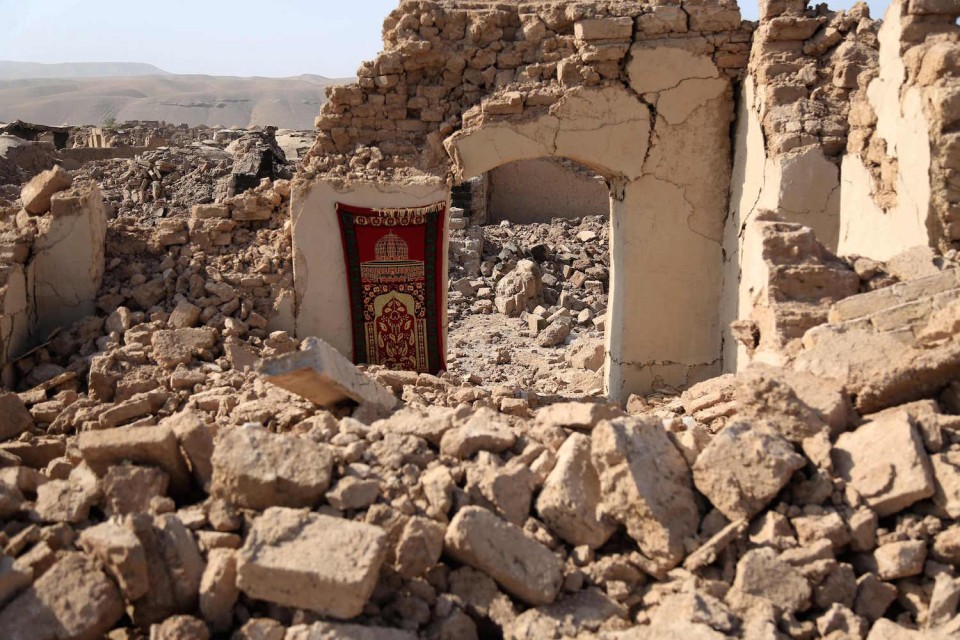
By Mohsen KARIMI
HERAT, Afghanistan, Oct 15, 2023 (AFP) – A magnitude 6.3 earthquake killed two people in western Afghanistan Sunday, with damaged prisons evacuated and residents fleeing a region where tremors have claimed at least 1,000 lives this past week.
Since October 7, a series of potent quakes have jolted Herat province, levelling whole villages, burying families and leaving thousands homeless as winter approaches.
In rural Injil district, near the epicentre of Sunday’s quake, 64-year-old Rustam narrowly escaped when tremors destroyed the remnants of his home and buried belongings he was trying to salvage at around 8:00 am (0330 GMT).
“We heard a very terrible and scary sound,” he said. “When we entered the house, like the power of God, it sounded like a bomb blast, and collapsed.”
His neighbour in Ghar Mushak village, 57-year-old Khudadad, also said a home he had hoped to repair was reduced to rubble.
“We people are hopeless,” he said. “We have nowhere to stay, it’s like we are in a ruined desert.”
Doctors Without Borders (MSF) said two new fatalities and 154 injuries were registered at Herat Regional Hospital, where patients were being ferried on stretchers and treated outside under gazebos.
“The situation is very critical,” MSF’s Afghanistan Programme Head Yahya Kalilah told AFP. “In terms of psychology, people are panicked and traumatised.”
“People are not feeling safe. I will assure you 100 percent, no one will sleep in their house.”
– Fleeing disaster –
The latest quake’s epicentre was 33 kilometres (20 miles) northwest of the provincial capital Herat city and was followed by aftershocks of magnitudes 5.4, 4.2, 4.3 and 4.4, the US Geological Survey said.
Officials said more than 528 prisoners had been released from Herat province and neighbouring Badghis province because jails “were in danger of collapsing” from quake damage.
Those freed included inmates who had served large portions of their sentences and showed signs of reform, according to the Prisons Administration Authority.
Many Herat city residents have fled due to the threat of aftershocks.
Haris Aryan said he sent his family south to Farah province to escape the trauma of the quakes.
“Many people, anyone with relatives or accommodation in neighbouring provinces, all of them have fled,” he told AFP. “Those who do not have anywhere to go… they are spending nights in the roads and parks.”
MSF official Kalilah predicted “casualties will be low” Sunday, because residents in the worst-hit areas were already living outdoors after their homes were destroyed last week.
Oxford University seismologist Zakeria Shnizai warned of further tremors in the days to come.
“Aftershocks occur due to the readjustment of rocks and faults that slipped during the main earthquake,” he told AFP.
“The process of readjustment can take a while, ranging from days to weeks or even months.”
– Aid challenges –
The quake series began on October 7 with a 6.3 tremor and eight powerful aftershocks, which devastated rural villages northwest of Herat city.
The Taliban government said more than 1,000 people were killed, while the World Health Organization (WHO) put the figure at nearly 1,400 late Saturday.
Another tremor of the same intensity killed one person and injured 130 others days after the initial quakes, as volunteers dug desperately for survivors in their ruined homes.
Dust storms then whipped up in the area, damaging the tents that survivors were relying on for shelter.
The WHO says nearly 20,000 people have been affected by the string of disasters, with women and children making up most fatalities, and aftershocks leaving them “in a persistent state of anxiety and fear”.
Earthquakes are frequent in western and central Afghanistan and are mostly caused by the Arabian and Eurasian tectonic plates jutting against each other.
Providing shelter on a large scale will be a challenge for Afghanistan’s Taliban authorities, who seized power in August 2021 and have fractious relations with international aid organisations.
Afghanistan is already suffering a dire humanitarian crisis, with the widespread withdrawal of foreign aid following the Taliban’s return to power in 2021.







